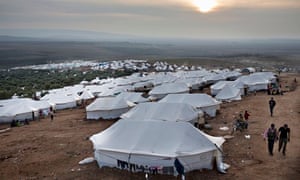Enlightened or Merely Hopeful?
"American security is undermined by frail and failing nations where hope is nonexistent, and where conditions foster radicalism, produce refugees, spark insurgency, and provide safe havens for terrorists, criminal gangs, and human traffickers."
"[Strategic development assistance] is not charity -- it is an essential, modern tool of U.S. national security."
Assertion message of 15 retired U.S. admirals and generals
 |
| Syrian refugees encamped at the Turkish border. Many of the world's refugees are not in tents but squatting in urban areas. Photograph: Paris Match/Getty |
This was, in essence, the message delivered by top military personnel, now retired, to the U.S. Senate Armed Services Committee this past June, taking stock of the current administration's loss of interest in following through on traditional American views dating from the end of World War Two that economic development assistance helps to prevent conflict in disadvantaged nations. Which led to a program of economic incentives and practical assistance by the U.S. to developing countries as a matter of internal policy reflecting on American national security.
"The factors that explain which countries have been at risk for civil war are not their ethnic or religious characteristics but rather the conditions that favour insurgency."These two expert academics in political science reached the conclusion through an analysis of global conflict that less than $1,000 in per capita income links with 41 percent greater odds that within any given year civil war will break out. Irrespective, they feel of political failures following popular uprisings in Egypt, Libya and Syria resulting from the Arab Spring fever that surged through these populations, the violence that followed might have been minimized if people had been aided in their ability to cope with rising food prices.
"These include poverty -- which marks financially and bureaucratically weak states and also favours rebel recruitment -- political instability, rough terrain, and large populations."
Professors David D. Laitin and James D. Fearon, political scientists, Stanford University
And it is true that protests were partially spurred in Egypt by the rising unaffordability of cooking and heating oils and basic foods, but in all three of those Arab nations cited, the rise of fundamentalist Islam had already long since begun, and the region's usual dysfunction arising from tribal, clan and sectarian antipathy, alongside tyrannies and dictatorships would guarantee that public restlessness and challenges to the current political order would ensue.
It has long been a truism that poverty breeds violence, and that people who have been disenfranchised, the voiceless, the vulnerable, the politically bullied and challenged are those who create the movements that lead to violence countering that which they are treated to. Yet facts and reality appear to prove otherwise; it is the well-educated and those from upper-class, economically stable backgrounds who form the base of the violent antagonists.
Creating a docile public by exporting humanitarian funds and charitable aid of all kinds simply removes the onus of responsibility from the tyrants who make the lives of their subjects miserable; transferring aid funding to those governments ensures that the funding is spent on their military and on lining the pockets of the elite. There is a middle way of convincing those nations receiving American largess that it will be halted until and unless a considerable amount of it trickles down to where it is needed.
There are some continents and regions of the world where, as in Africa and the Middle East, endless streams of funding finds its way from the international community to those it deems whose interests they must support, if only to ensure that sharing wealth will not only help to enhance the lives of those who struggle to survive beyond mere existence, but that it will keep them there. The current situations unfolding in the Middle East and Africa prove otherwise.
Europe has been invaded as a result of innumerable refugees fleeing carnage imposed on them by a vengeful, murdering dictator whose response to a protest from a large segment of his sectarian population for equality rights, has been to destroy not only their will to protest, but their homes and their lives. The implosion of Iraq and Syria has been along sectarian lines. The growth of terrorist militias has morphed from the stimulation of the Muslim Brotherhood established 80 years earlier, by Saudi Arabia, by Iran.
Those who consider themselves 'progressive' liberals in their politics see sacrifice on their part as a requirement to aid those living in dire conditions of impoverishment and brutality, and they rise in indignation against a new administration that has decided to increase the budget of its military by cutting billions from the diplomatic and foreign aid budget to pay for that increase. And non-state charities feed on that guilt, prodding those who support their humanitarian business model to lobby government on their behalf.

Labels: Conflict, Foreign Aid, Poverty, Tyranny, United States
0 Comments:
Post a Comment
<< Home